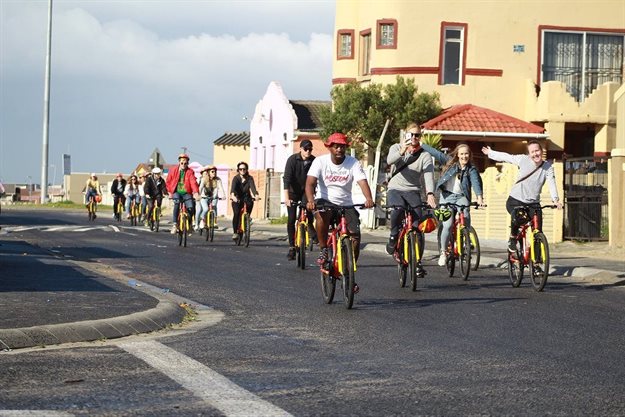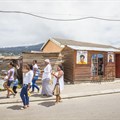#CreativeMornings: How 18 Gangster Museum is lifting others as it rises in Khayelitsha

The youngest of five siblings, Nqeketho's half-brother was a prominent gangster who used to sell drugs in the community but met his end after a rival gang shot him 14 times. Nqeketho's biological father was also involved in drug pedalling and gave him a gun for his 14th birthday. Many of his football friends joined gangs too, and four died in the cross-fire.
One could make the assumption that growing up under these conditions would leave you a more susceptible victim of your circumstances, but that's not necessarily true, and certainly not so for Nqeketho.
"When you come from Khayelitsha, there's always a particular identity which people attach to you - that you come from a dangerous community so you probably are a gangster, or you probably have some criminal elements in you, and you always have to somewhat try and prove to people that not everyone who comes from Khayelitsha is like that," he said. Nqeketho lamented the fact that even those who live in Khayelitsha start embodying the negative narrative of the township and project that negativity through their actions, resulting in a disconnect between those who live in Khayelitsha and the space that is their home.
Tackling societal injustices
He made sure to carve out a more positive path for his life. Deciding that university was not for him, he dropped out and decided to become an entrepreneur, completing a six-month course at the Raymond Ackerman Academy where he was fatefully reunited with an old friend and current business partner Siyabulela Daweti. Together they decided to tackle the injustices faced by their communities by launching 18 Gangster Museum. While it isn't the grandiose R2.4m museum they'd initially dreamed up, it certainly serves a bold purpose.

"Many people are afraid of dealing with gangsterism because it's scary, it's frightening, but in the absence of people who actually engage with these difficult problems, who's going to solve them. If no-one decides to participate in solution-making mechanisms, we're going to normalise these things, and these things will kill our societies. It will kill the next generation. Far more important, it will create a horrible environment for the next generation to inherit," said Nqeketho.
Why a museum?
Associated with housing things of antiquity, Nqeketho and Daweti want to make gangsterism a thing of the past.
"One of the first things that came to mind when we were trying to build a solution was that we needed to construct counter narratives that speak positively about our spaces, so all the negativity needs to be housed in a museum where it belongs - in the past," explained Nqeketho.
Now running for three years, 18 Gangster Museum teaches young people about the real implications of joining gangs, exposing them to what truly transpires within gangsterism, and encouraging them to make better life choices and contribute to the upliftment of their communities. Nqeketho and his team have worked with 4,200 youth so far through visual art classes as a medium of expression, allowing them to express their experiences and emotions, as well as through a soccer club that teaches fundamental life skills.
Self-sustaining model
Faced with the question of how to self-sustain the organisation, utilising Daweti's education in tourism, they decided to use the museum as a tour attraction to the township. Implementing a "one-for-one" model, every visiting tourist to the museum also pays for a child to visit for free. From the get-go, however, the pair had to deal with a significant obstacle: "When we started out, the challenge was, how do we get people who are incredibly afraid of the townships to come to the townships, and to come to a space which speaks to a particular subject matter which happens to be the reason why they are not coming to the townships - gangsterism," Nqeketho explained. They shortly realised though that gangsterism can also be a drawcard as people are always intrigued by its dynamics.
Fortune favoured the pair, and they stumbled upon a client that brought in 40 visitors over three weeks for tours of Khayelitsha and the business has been growing ever since with social media and general media coverage helping drive its development. They then started diversifying their product offering and now offer a range of tour options, including a weekend getaway in Khayelitsha, introducing people to the township and the people that live there while helping to construct a new, more positive narrative.

Tourism growing in Khayelitsha
Khayelitsha is transitioning into a different space, said Nqeketho, as mind-sets in the community are changing and tourism develops further in the township. 18 Gangster Museum, through its tours, partners with other smaller organisations, embracing a 'lift as I rise' ethos that shares the benefits of their success with the broader community. It offers free monthly tours to children, exposing them to people who are positively contributing to the livelihoods of communities in the township, providing positive role models, while changing their internal narrative about their home and its potential.
"We can't expect people from the outside to think positively about our spaces; we need to start thinking positively about our spaces ourselves, and then other people will follow suit. I would say this is an ideological metamorphosis that we are undergoing at this current moment in time," said Nqeketho.
Working with ex-gangsters
Ensuring an authentic experience, 18 Gangster Museum hires ex-gangsters who run the experiences using their first-hand knowledge of the system. The process also serves as a means of reintegration for those ex-offenders who want to re-join society. When communities see them working and contributing to the community's development, it helps change society's perception of them and eases the stigma associated with being an ex-gangster.
Asked about the level of protection offered to visitors, Nqeketho said, "Part of what we are trying to create is that we do not want you to feel scared. We don't want to overprotect you. We want you to get to that uncomfortable point and be able to break down those invisible walls that make you frightened in those places so that you can connect with those spaces and connect with those people, so we don't want to create a heavily controlled environment."
After 8500 visitors #18Gangstermuseum still offers amazing experiences. Taking township tourism to a whole new level. #travel24 #ilovecapetown #Asijiki #Airbnb #tripadviser #khayelitsha #shortleft pic.twitter.com/xeWBWAjOgD
— 18_Gangstermuseum (@18_Gangstermuse) May 10, 2019
Foreign vs local visitors
While foreigners are keen to engage in township tours like those offered by 18 Gangster Museum, it's still a struggle to get locals involved, said Nqeketho, noting that part of the reason for this is because of the nature of our recent past, "especially in the Western Cape where structurally we are very divided as a people, so we still do not find places of convergence where we can connect as a people. And then sadly, when it comes to infrastructure, those who create new spaces still create spaces that perpetuate that divide".
Looking to the future
Looking to go beyond its one-container setup, 18 Gangster Museum has received 17 more containers and is keen to build a state-of-the-art museum of Khayelitsha that's engaging, interactive, and tells the story of the vibrant township.
Keen to get out of your comfort zone yet? Visit www.18gm.co.za for more info.
































